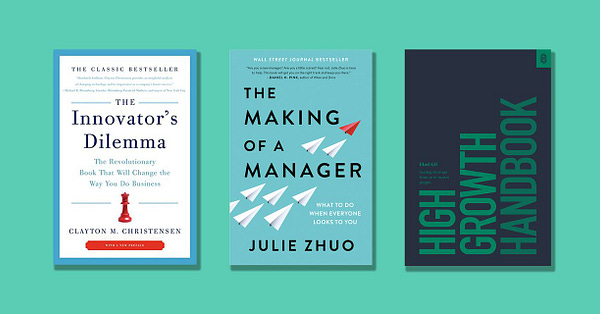WN#17: Communication and Leadership in Times of Crisis
This week, I write about Leadership, Management, Technology, Productivity, Psychology, and more. I hope you like it!
Hello! Thank you for joining me another week in this seventeenth issue of the newsletter. I hope you had a blast on yesterday's Halloween, and I wish you also for today's All Saints.
The pandemic's situation seems to be going worse, with new restrictions and lockdowns in most countries. In my case, I am moving to remote again. Before starting, I hope you all stay safe, and I wish you all the best.
This week I took some time to review what I did right and wrong on the last lockdown. Now that everything seems to be directed to it again, it is the right time to think about improving it.
In my personal experience, I lost the daily morning routine during the lockdown. And also, I didn't balance very well work and family. Stress appeared as a lack of motivation and fatigue. This shouldn’t happen again.
I recommend you keep the same routines, the same habits that took you the effort to create, take the necessary breaks that your brain and body need, and separate the time of work from your personal life.
Today my selection of topics includes Leadership, Management, Technology, Productivity, Psychology, and more.
As I always end this introduction, please, do not hesitate to add your comments or share your feedback. One of my goals is to learn from you. And if you like it, please share it. The more we are, the more we will share and have fun.
🗣️ Communication and Leadership in Times of Crisis
If we are going to adopt full-time remote work or any other temporary solution, it will be helpful to keep in mind some tips for improving communication and support teams. Being there for people will be more important than ever in the next months.
Remember that given the situation, the uncertainty, and in some cases, solitude, people will probably suffer from stress and anxiety. Isolation is not only exclusive for people that live alone. Depending on the personality, you'll also find very sociable people that will suffer from it.
Communicate frequently, be accessible, and give support. Some teams practice daily meetings and weekly meetups, but consider seriously scheduling them and keeping everybody connected. And take extra time to chat a little about off-topics. Give some time for improvising casual and informal talks and have some fun! Also, provide a channel for exchanging feedback and help. I recommend you to schedule time for listening. Some people will need special attention and support, don't wait to hear it from them, ask.
Be interested in your team's habits and home environment. People should attach to a routine, working time should have a clear start and end time. WFH allows us to conciliate, but that doesn't mean that we will do it right. Remember the people that pauses are necessary for efficient work, that our brain only can focus 45 minutes.
It is important to watch out for the signs of stress and burnout. Depending on the situation, remember to lead with vulnerability, show empathy, and offer flexibility.
This week, Amy Edmonson shared a video from TED about how to lead in a crisis. In uncertain times, when people look for security, leaders must:
Communicate with transparency, humility, and often. Share what you know and admit what you don't.
Act with urgency. Inaction leaves people feeling lost and unstable.
Hold purpose and values. Values can be your guiding light when everything else is up in the air.
Share power and control. Ask for help, give people a purpose, and work as a team.
Amy explains much better, so please check it out.


Before ending, I am going to share the last article from HBR from the Dalai Lama on Why Leaders Should Be Mindful, Selfless, and Compassionate.
We are naturally driven by self-interest; it’s necessary to survive. But we need wise self-interest that is generous and cooperative, taking others’ interests into account.
📖 A New Reading Tradition. Why Not?
I’m a subscriber of Seth Godin's daily newsletter. Yesterday, as you could imagine, it was related to Halloween. But it also included a very interesting initiative: The Thanksgiving Reader.
The idea is simple: At your Thanksgiving celebration (and yes, it’s okay to use it outside the US), consider going around the table and having each person read a section aloud.
Before the meal starts, all you need to do is put one page on each person’s chair and follow the simple steps.
During the ten or fifteen minutes your family spends reading together, millions of people will all be reading the same words, thinking about the same issues, connecting with each other over the essence of what we celebrate.
Isn't it cool? These days, with the pandemic limiting our meetings, it is a fresh and great idea to include these kinds of new activities, knowing that at the same time, all over the world, people will be reading and sharing the same thoughts. And this can be done remotely also. Why not?
Maybe you don't celebrate Thanksgiving, but the same idea could be used in any other celebration, thinking of the next Xmas. Don't you think?
🧑💼 Becoming a Manager
If you could read my past newsletters, I am continually thinking about the pros and cons of looking for a job change, for new challenges. The engineering manager is one of the positions that I have been thinking about.
This week, Gergely Orosz shared an interesting article about what becoming an engineering manager feels like. The loneliness from being part of a team to be a manager and how people act differently when you’re managers.
And the people you should also rely on. It is interesting how Gergely highlights that you find out that you have more in common with your own manager than your directs.
I also shared some experiences in my blog, a post named Who wants to be a manager?. Based on Julie Zhuo’s book, I shared some experiences about this transition to a management position.
Last but not least, if you’re looking for an Engineering Manager position, please check this Job board compilation made by Álvaro Salazar. Sorry, mostly located in Spain, but there are some remote also.
😎 Being Authentic, What Does it Mean?
Tomas Chamorro is ultimately very active and is sharing fascinating publications and debates. This week he shared an article from Forbes, The Dark Side Of Authentic Leadership, about the ability to fake authenticity.
Just think about it for a minute. have you recently met a leader who shows fake authenticity? Who is showing a different version of itself?
Following the article ideas, he also shared a poll asking which leader would you prefer?. A Confident & Authentic leader, or a Competent & Considerate one. As expected, the last one was the winner, with almost 84% of the votes.
This topic is also related to the vulnerable leadership that I shared in the last newsletter, shifting from an invincible and confident leader (Tomas call them Macho leaders) to a more vulnerable and honest one.
When asked about the traits, he offered the following description, which was not without criticism. Especially the authentic definition. He didn’t say that he was thinking about the fake sense of authenticity, this unfiltered and uninhibited version that some leaders want their people to perceive looking for admiration.


Being authentic is naturally showing oneself with confidence, sharing our virtues, defects, and rarities openly, establishing a relationship and connection based on mutual trust.
Someone authentic shows itself as it is, without falsehoods, without trying to be another person that it really is not. We tend to adapt our behavior based on situations, but the authenticity is constant.
As Tomas ends his article: It seems clear to me that between a leader who is authentic but incompetent, and one who has worked hard to against her nature to act in a competent way and have a beneficial impact on others, the choice should not be too hard.
📜 The Lack of Documentation in Organizations
Lenny Rachitsky raised this question, a classical debt and open topic for most of the companies:

It is very useful to navigate these kinds of threads to look for ideas from the people to share their feedback and knowledge.
In this case, there are no big surprises, the usual tools, and the same issues. Maybe it is interesting the increasing usage of notion. I have also started using it personally, and even I haven't started using it daily, I see it as a powerful tool. I recommend it.
As somebody answered, the point is how to incentive documentation and how to use it efficiently? I also thought about the same when I first read at first Lenny's question. Why are we more eager to share our learnings and knowledge on social media or blogs than within our organization?
I see on it a Cultural failure. Which are the rewards that we are looking for on the outside that we don't find inside? Is it only about recognition? Are there chances to share knowledge? Maybe this should be the real issue to focus on and a good starting point to improve every organization's shared knowledge.
I usually write in my blog, and I also send this weekly newsletter. And I write about topics that can be related to my daily work or are far away from it. But wouldn't it be interesting to promote people to share knowledge and topics inside the departments and the whole organization?
🤑 Again, Successful Self-publishing Cases
I don’t have time for more side projects than writing this newsletter, but I feel healthy envy when I see these people.
Last week I shared the example of Morning Brew. This week, let’s start with Daniel Vasallo. In this article, he shares how I made $210,822 selling a pdf and a video on the internet.
You could find him on Twitter, where he did a recent AMA:


The following person hasn’t succeeded yet in his new venture. But it is interesting to see journalists leaving behind the security of the big media to start a newsletter. Eric is a 6-year Bloomberg one, a tech reporter that now will work on his own. It will be free until January, so check it out!


📻 Podcast and Book Recommendation
I still hadn’t enough time for listening correctly to this one, but a podcast with Tim Ferriss and Seth Godin is a talk not to miss. As Peter says in the following tweet, an episode where to take notes.
In the following link from the Tim Ferriss website, you'll find access to all streaming possibilities.
Before ending today's newsletter, WSJ recommends Books to Read before you start a business. I have some of them, and I have written about them. If you're interested, you could find some of Clay's, Tony's, and others' ideas from books in my blog.


That’s it! Thanks for reading. I hope you liked it!
Please, do not hesitate to add any comments. I am open to any suggestions, so if you want to add a comment or contact me, I encourage you to do it.
If you found something interesting, maybe you would like to share it with your colleagues, friends, or family. The more we are, the more we learn from each other.
And if you haven’t subscribed yet, you could do it now. It’s completely free, and you could unsubscribe at any time. You’ll receive as much as an email a week.





